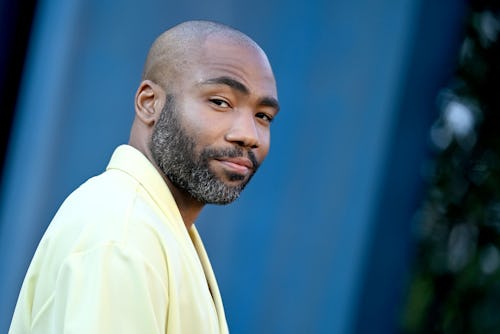Donald Glover interviewed Donald Glover
And … it was actually pretty good?

Donald Glover interviewed himself for Interview’s latest cover story. It’s a bit gimmicky and doesn’t bode well for entertainment journalism or the future of the celebrity interview, but the piece itself is actually... pretty good? In it, Glover takes what could have been a self-congratulatory thought experiment at the pinnacle of celebrity narcissism and manages to deliver something that gets at the idea of authenticity. Specifically the unique authenticity of Donald Glover.
Glover wears many hats. He’s a rapper, an auteur, a comedian, an actor, and undeniably a voice of the millennial generation. But as he sets the scene, we don’t see the frenetic life of a multi-talented Hollywood celebrity, the kind who you’d think wants to interview himself. We get Glover’s idea of a Grant Wood painting. He’s on his farm staring at a tangelo, his partner painting, his children excitedly foraging under mulberry trees. But his mind remains consistently consumed with art.
Glover says he sees himself as Willy Wonka, an idea that is equal parts silly and serious, making it actually pretty apropos. The draw for Glover to the character though is his privacy. “You have your factory, you make something, put it out, and then close shop to the public for a while,” he says. So it’s no surprise when he admits that he doesn’t like social media. “Everyone I meet who’s active on the internet looks tired as fuck in real life,” he laments, also admitting that having grown up in the 80s is an advantage at this point. It helped prime him for being able to separate life online from life in the real world, something he worries future generations won’t be able to delineate.
It’s a thread Glover pulls throughout his interview-style essay, being incredibly candid and cryptic at the same time. He’s certainly mastered in his decades in the business knowing how to keep something of himself for himself. He lets on to this when speaking about quagmire topics like race and cancel culture. Of the latter he simply says, “Yuck. Can we not?” And of the former he digs deeper, while also admitting, “I hate talking about race more than five minutes unless it’s with other Black people and/or we’re laughing.” He toys with the question of if he’s afraid of Black women and how that’s played into his narrative, while also accusing his own question of trying to weaponize Black women to “question [his] Blackness.” When he asks himself if “Black” has lost its value he says, “I definitely think it’s diluted in the marketplace. Because everyone can do it and it doesn’t have to be authentic. It happens every 10 to 15 years. I think we’re at the tail end of it now, though.”
Glover isn’t afraid to get into the weeds a bit either, revealing that he’s somewhat obsessed with the grab bag concepts of art making. He tussles with relevancy over sustainability in his career, and whether “niche culture” is relevant. He admits to letting criticisms shape his trajectory in a way that seems loving even when he’s talking about “when it felt like everyone hated [him].” He seems to like anything as long as its authentic, including criticism, saying “You have to sift through and try and see if someone is debating in good faith. The internet doesn’t provide a large-enough amount of that.”
The biggest surprise of the interview is perhaps the way food ties into everything for Glover. He weaves in descriptions of food as though he has been watching lots of Anthony Bourdain re-runs — whom he mentions and also praises for having been able to distinguish one thing from another without judging either. To Glover, art all seems to have a food analogy behind it. Dave — which he discusses a bit curtly — is a burger with the freshest ingredients, so it should be “consumed quickly.” Atlanta on the other hand is “osso buco served with risotto, prepared by a chef who studied in New York City, spent five years on the road, worked at a Michelin star spot for three years, and used the money to buy a small farm. He invites you over to try out some recipes he’s been working on with his friends using the produce they grew together. Even if you don’t like it, you can’t say it’s not high quality. The quality is undeniable.” And what’s also undeniable after reading Glover on Glover is that he is an artist, if not a secret foodie who may or may not be opening his own invite-only restaurant, much like his hero Willy Wonka.